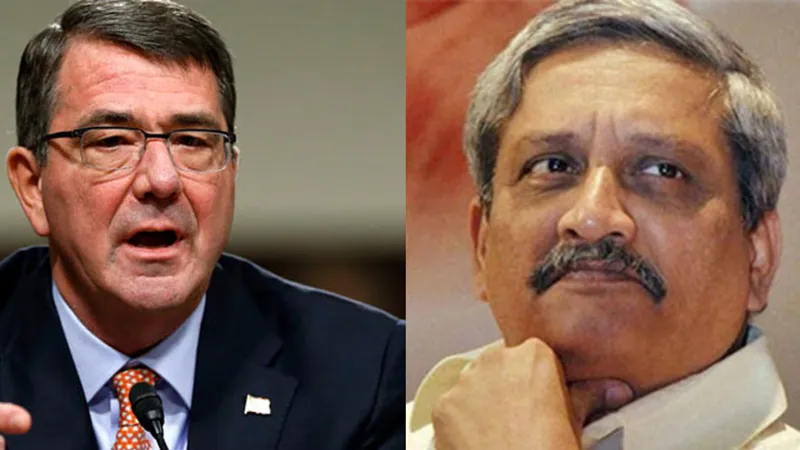US Defence Secretary Ashton B. Carter, on his first visit to New Delhi after taking charge, will hold talks with Defence Minister Manohar Parrikar this week. On the face of it, Parrikar and Carter have little in common. The former Goa chief minister is a newcomer to the national stage; Carter's formidable reputation as a leading defence intellectual precedes him. Carter has served as assistant secretary, undersecretary and deputy secretary in the Pentagon since the early 1990s, before becoming the top gun of the US defence department last year. He has taught at Oxford University and the Harvard Kennedy School.
But Carter and Parrikar do share an interest in science and technology. Carter has a PhD in theoretical physics from Oxford. Parrikar has graduated from IIT-Mumbai in metallurgical engineering, run a private business producing hydraulic equipment and is interested in fluid power engineering.
This shared background might come in handy as the two leaders seek to inject fresh life into the Indo-US Defence Technology and Trade Initiative (DTTI). Although it was launched with much fanfare under UPA 2, there has been little progress. Carter, who led the negotiations on the US side when the DTTI was launched in 2012, is acutely conscious of the problems on both sides. If he is eager to impart greater strategic purpose to America's bilateral defence relationship with India, Carter will find Parrikar rather different from his predecessor at South Block — A.K. Antony.
Sea Change
Within a year, the Narendra Modi government has brought significant changes to India's defence policy. It has ended the paralysis on arms acquisition and put greater emphasis on creating a defence industrial base. It has encouraged the participation of private and foreign capital in Indian defence production. These initiatives have created a much better policy environment for the DTTI.
Equally important, Parrikar has demonstrated the political will to shake things up in the MoD, which had become acutely sclerotic under Antony's extended reign. Parrikar decisively cut through the bureaucratic logjam on the purchase of Rafale fighters. He has also taken the surgeon's knife to the DRDO. After sacking the DRDO chief earlier, Parrikar has separated the posts of DRDO chief and scientific advisor to the defence minister. For the first time since Indira Gandhi brought a young scientist, V.S. Arunachalam, to head the DRDO in the early 1980s, Parrikar has injected younger blood into leadership positions.
Vietnam to Vizag
That Carter is stopping at the Visakhapatnam naval station on his way from Vietnam to Delhi tells us how radically the Asian context for an India-US partnership has changed. Vietnam, which inflicted a humiliating military defeat on the US exactly four decades ago, is now actively seeking stronger defence ties with Washington.Well until the mid-1980s, Delhi had to constantly deal with Washington's misperception that India had given base facilities to the Soviet Union in Vizag. Today, Carter sees Vizag as the lynchpin of India's "Act East" strategy. Vietnam and India have not given up their security cooperation with Russia after the collapse of the Soviet Union. Even as they buy weapons from Moscow, Delhi and Hanoi see Washington as critical to the new balance of power, a part of their "Russia Plus" strategy amid the rapid rise of Chinese military power. Last January, PM Narendra Modi and US President Barack Obama unveiled a new vision for security cooperation in Asia and the Pacific.
It is now up to Parrikar and Carter to translate that vision into a practical roadmap on a range of areas — from collaboration on aircraft carrier design to coordination of humanitarian assistance and disaster relief, and from joint production of weapons systems to coordination with friends and partners in the Indo-Pacific.
Carter's well-known commitment to deepening defence cooperation with India and Parrikar's determination to recast India's defence structures do set the stage for a rebooting of the India-US strategic partnership. Both are under pressure to cope with the challenges of the current fluid power dynamic in Asia.
(The writer is a distinguished fellow at the Observer Research Foundation)
Courtesy: (
The Indian Express) 2 June, 2015
The views expressed above belong to the author(s). ORF research and analyses now available on Telegram! Click here to access our curated content — blogs, longforms and interviews.
